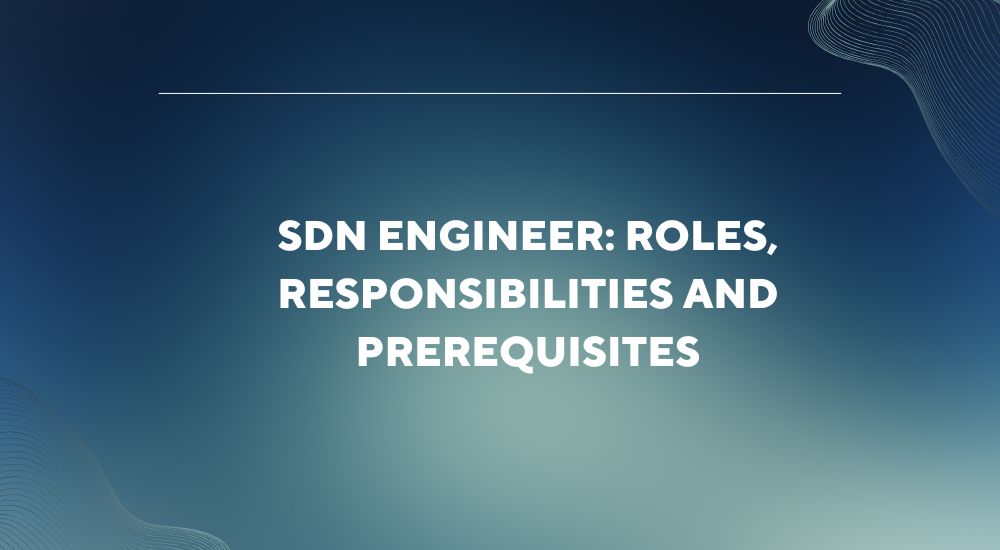TRUSTED BY THE SMARTEST TEAMS IN THE WORLD FOR CERTIFIED CANDIDATES
SPOTO Blogs
Useful learning materials to become certified IT personnel
-
- 424
- SPOTO
- 2025-07-09 17:37
-
- 583
- SPOTO
- 2025-07-09 14:58
-
- 386
- SPOTO
- 2025-07-09 14:54
-
- 439
- SPOTO
- 2025-07-09 14:41
-
- 367
- SPOTO
- 2025-07-07 11:31
-
- 481
- SPOTO
- 2025-07-07 11:28
-
- 418
- SPOTO
- 2025-07-04 15:19
-
- 352
- SPOTO
- 2025-07-03 15:55
-
- 368
- SPOTO
- 2025-07-03 15:25
TRUSTED BY THE SMARTEST TEAMS IN THE WORLD FOR CERTIFIED CANDIDATES
SPOTO Blogs
Useful learning materials to become certified IT personnel
-
- 424
- SPOTO
- 2025-07-09 17:37
Table of Contents1. What is a CyberOps Analyst?2. How much does a CyberOps Analyst Make?3. What Are the Qualifications to Become a CyberOps Analyst?4. Similar Occupations of CyberOps Analysts This article will introduce you to what a CyberOps Analyst is, the career information of a CyberOps Analyst and the necessary conditions to become a CyberOps Analyst. By reading this article, you will gain an in-depth understanding of the profession of CyberOps Analysts. 1. What is a CyberOps Analyst? CybersOps Analysts help protect a company's systems and data from cybercriminals. They continually assess network security and look for ways to ensure that security measures are adequately planned and implemented. CyberOps Analysts are professional positions that focus on monitoring, analyzing, and optimizing operational data on Internet platforms. Their core responsibilities are to discover operational problems and growth opportunities through data insights, thereby providing better data support for business decisions, and ultimately achieving growth in the number of users, increased activity, and thereby achieving economic transformation, helping companies better achieve their operational goals. The work of CyberOps Analysts revolves around "data" and runs through the entire operation process, including data monitoring, collection and conversion, building or using data monitoring tools, and real-time or regular tracking of core indicators. They should conduct multi-dimensional analysis of the collected data to identify patterns or anomalies, and use statistical methods to quantify the root causes of the problems. Finally, convert the analysis results into executable operational strategies, form data reports, and report to the operations team, product team or management. 2. How much does a CyberOps Analyst Make? According to ZipRecruiter data, as of June 5, 2025, 42.1% of operations analysis positions earn a monthly salary of 8-15K, or an annual salary of 10-18W, which is 52.7% higher than the national average salary. Based on academic qualifications, the monthly salary for a college graduate is about 11.3K; based on experience, the monthly salary for a fresh graduate is about 12.3K. Newcomers to the industry may have lower salaries and are mainly responsible for basic data collection and simple analysis work, with a monthly salary of about 5-8K. CyberOps Analysts with 3-5 years of work experience can independently undertake complex analysis tasks and provide effective suggestions for operational decisions. Their monthly salary is usually 8-15K. Experienced senior analysts who have the ability to lead a team or are proficient in data analysis in a certain field can earn more than 20K per month. 3. What Are the Qualifications to Become a CyberOps Analyst? (1) Obtain a Bachelor's Degree A bachelor's degree in Cybersecurity, Computer Science, Information Technology, or a related field is typically required. Some roles may accept equivalent work experience in lieu of a degree, but a formal education provides foundational knowledge in areas like network security, operating systems, and threat analysis. (2) Develop professional skills CyberOps Analysts often need to have proficient skill in firewalls, intrusion detection, VPNs, and security protocols. Understanding of network architectures and vulnerabilities is critical. They also need use security tools, operating systems, have ability of scripting and programming, such as the ability to write scripts in Python, Bash, or PowerShell for automating tasks. (3) Earn Industry Certifications Obtaining a certification that is highly recognized by the industry can prove your professional ability and ability to perform the position, and can also enhance your competitiveness in the workplace. Certifications validate your expertise and are often preferred by employers. Key certifications include: Cisco Certified CyberOps Professional focuses on threat detection, incident response, and security operations. Updated in 2025 to include AI-driven analysis. Advanced training is also important: pursuing specialized courses in AI-driven security, cloud security, or ethical hacking, platforms like Cisco's CyberOps training or SANS Institute offer targeted programs. 4. Similar Occupations of CyberOps Analysts Data Analyst: Data Analyst focuses more on the macro analysis of the company's data, while CyberOps Analyst focuses on "operation scenarios". The analysis results directly serve specific operational actions such as attracting new customers, promoting activation, and conversion. Operation Specialist: Operation Specialist focuses on execution, while CyberOps Analyst focuses on using data to guide Operation Specialist on "what to do and how to do it more effectively". Risk Operations Analyst: In-depth analysis of customer credit behavior, such as repayment history, credit score changes, etc., to identify potential risk patterns. Develop and maintain credit scoring models and risk prediction models to improve the accuracy of risk assessment. Operations management analyst: fully understand the core logic of business operations, responsible for tracking and re-analyzing key indicators within the project, outputting business analysis reports, and assisting business decision-making. Also need to study business development trends and output feasibility market insight reports. Usually set up in larger companies, responsible for the optimization and management of the overall operation process. -
- 583
- SPOTO
- 2025-07-09 14:58
Table of Contents1. What is a Clinical Medical Assistant?2. How much does a Clinical Medical Assistant Make?3. What Are the Qualifications to Become a Clinical Medical Assistant ? This article will introduce you to what a Phlebotomy Technician is, the career information o and the necessary conditions to become a Phlebotomy Technician. By reading this article, you will gain an in-depth understanding of the profession of Contact Center Engineer. 1. What is a Clinical Medical Assistant? A clinical medical assistant (CMA) is a healthcare professional who combines administrative and clinical skills to provide medical support and assistance to physicians and other healthcare providers. Other job duties for a Clinical Medical Assistant may include the following: Measure patient vital signs Assist providers with exams and procedures Administer injections or medications to patients Perform EKGs, venipunctures, and other necessary laboratory procedures Check in patients as needed for admission and discharge upon arrival and departure Answer telephone calls and answer questions Update and maintain patients' Electronic Health Records (EHR) 2. How much does a Clinical Medical Assistant Make? According to ZipRecruiter data as of July 1, 2025, the average hourly wage for a Medical Assistant in the United States is $20.18. Salaries range from as high as $27.52 to as low as $12.81, but most Clinical Medical Assistant salaries in the United States currently range between $17.07 and $21.83. The average salary range for a Clinical Medical Assistant varies greatly, which suggests there may be many opportunities for advancement and increased pay based on skill level, location and years of experience. 3. What Are the Qualifications to Become a Clinical Medical Assistant ? (1) Obtain a Bachelor's Degree A bachelor's degree is not necessary for a career as a Clinical Medical Assistant. You can enter the field by earning a two-year associate's degree in medical assistantship or a certificate program that can be completed in one year or less. (2) Develop professional skills Clinical Medical Assistants often need to have a variety of professional skills to be better qualified for the job. First of all, they need to have good interpersonal communication and coordination skills, be able to patiently receive patients, record medical history in detail and answer questions, help patients relieve tension and improve their medical experience. At the same time, they need to have solid clinical operation skills, including measuring vital signs, drawing blood, performing electrocardiograms, treating wounds, and assisting doctors in minor outpatient surgeries. In addition, they must be proficient in the correct use and daily maintenance of medical equipment to ensure the safety and efficiency of the diagnosis and treatment process. In terms of document and data processing, accurate entry and updating of patient information are required to ensure the integrity and confidentiality of medical records. They must also be familiar with medical laws and regulations and infection control standards, strictly abide by operating procedures, and reduce medical risks. (3) Earn Industry Certifications Obtaining a certification that is highly recognized by the industry can prove your professional ability and ability to perform the position, and can also enhance your competitiveness in the workplace. Therefore, we recommend that you obtain the Clinical Medical Assistant (CCMA) certification. Clinical Medical Assistant (CCMA) has a certain degree of recognition and value in the medical industry. Having a Clinical Medical Assistant (CCMA) certification (usually a certificate issued by the National Healthcareer Association (NHA) in the United States) can help you work in a variety of medical support positions. 4. Similar Occupations of Clinical Medical Assistant Phlebotomist Nursing Assistant (CNA) Surgical Technologist Cardiovascular Technologist/Technician EKG Technician Patient Care Technician Medical Office Assistant Medical Records Specialist Health Information Technician -
- 386
- SPOTO
- 2025-07-09 14:54
Table of Contents1. What is CCNA?2. How to pass CCNA?3. What is the use of CCNA certification?4. Is it hard to get the Cisco CCNA certification studing by yourself?5. What are the advantages of learning CCNA through online courses? Cisco CCNA certification refers to a professional IT certification which is devoted to improving your knowledge and skills in network fundamentals and access, IP connectivity, IP servicesd security fundamentals to Serve customers. This article will introduce you what is the best way to get the Cisco CCNA certification and is it hard to get the Cisco CCNA certification studing by yourself. 1. What is CCNA? Cisco CCNA certification refers to a professional IT certification which is devoted to improving your knowledge and skills in network fundamentals and access, IP connectivity, IP servicesd security fundamentals to serve customers. CCNA validates a broad range of fundamentals for all IT careers—from networking technologies, to security, to software development - proving you have the skills businesses need to meet market demands. The CCNA (200-301) exam covers a wide range of networking topics, including: Foundational concepts Routing protocols Switching technologies Network services Security fundamentals Automation & programmability 2. How to pass CCNA? Cisco certification exams are undeniably one of the foremost difficult exams within the world. So to achieve certification in Cisco, you would like immense dedication and diligence. Most importantly, you must possess the right expertise to become a Cisco-certified professional and pass the Cisco Certified Network Associate CCNA (200-301) exam. In order to achieve pass the exam, you should have viz, common key skills, like communication skills, troubleshooting skills, organizational skills, customer service skills, analytical skills, soft skills revolving around Microsoft Office Suite and Cisco equilibrium, and also the knowledge of industry-specific tools. 3. What is the use of CCNA certification? According to statistics from the website, the expert point out that CCNA is base of computing, he suggest to do CCNA first then others certifications to have the strong base and understand concepts clearly. Cloud compute is most trending technology today and for future. The value of CCNA will also be further enhanced with the rapid development of the Internet big data industry. Whether you're looking for a new job or a promotion within your current tech company, an additional Cisco certification can help. CCNA training and certification is the best way to demonstrate your exceptional IT skills. If you have CCNA certification, it will help you find a satisfactory job. When you have Cisco certification, your resume will stand out more than those without certification, which makes you more competitive. Most recruitment decisions are made based on limited information on resumes, and when you have this certification, they will further consider the value you can create and calculate the benefits they can get from you. This will also help you get promoted and get a higher position in the same organization in the future. 4. Is it hard to get the Cisco CCNA certification studing by yourself? For office workers, it is very challenging to arrange their time for study after work and professionals often have busy job schedules, making it difficult for them to attend class regularly. This shows that they more like doing their own study for the exam. Therefore, they need to arrange their time in their spare time, but this arrangement varies from person to person and is not suitable for most people. This training approach may benefit you or hurt you. Using the right approach will help you understand the exam's subject matter and enable you to pass. In addition, those who self-study courses need to collect relevant CCNA course materials by themselves, which not only takes time but also may miss some information, which is inefficient. 5. What are the advantages of learning CCNA through online courses? According to the feedback from those who passed the course, Cisco academy is a better option to get CCNA certification. They will provide you with the great fundamental knowledge and help you save your time. By enrolling in the course, you will receive: (1) Structured course design SPOTO will design course outlines based on subject logic and learning rules, progressing from basic to advanced levels to ensure that no knowledge points are missed and the connections are reasonable. (2) Highlight key points and difficulties Professional teachers will mark high-frequency test points and easy-to-make mistakes based on their experience, and strengthen them through case analysis and special exercises, helping learners save time in "figuring out what is important on their own". (3) Fixed progress and tasks Courses usually have clear class times, homework requirements, and periodic assessments, which are equivalent to "external coercion" and can force learners to proceed according to the plan. If you don't have enough self-control, you had better go and take a class. (4) Professional teaching materials and tools SPOTO will provide real exam question banks, reliable software and other resources. These materials have been screened and organized and are more accurate and authoritative than the scattered content collected during self-study. (5) Reduce the cost of trial and error The cost of taking a class may seem higher than self-study, but it is actually equivalent to "spending money to buy experience," which saves a lot of the invisible cost of wasting time. (6) Understand the latest industry trends SPOTO's professional teachers often have industry experience and will share cases, tool usage and trends from actual work to help learners connect to real application scenarios. -
- 439
- SPOTO
- 2025-07-09 14:41
Table of Contents1. What is a Phlebotomy Technician?2. How much does a Phlebotomy Technician Make?3. What Are the Qualifications to Become a Phlebotomy Technician?4. Similar Occupations of Phlebotomy Technician 1. What is a Phlebotomy Technician? A Phlebotomy Technician is a medical professional who assists professional phlebotomists in performing blood tests and related tasks. Generally, becoming a phlebotomist requires fewer qualifications and is less difficult than becoming a phlebotomist. Other job duties for a Phlebotomy Technician may include the following: Prepare patients for blood draws Explain blood draw procedures to patients and answer any questions about the process Follow all health and safety protocols and procedures to maintain sanitary work areas Collect medical testing materials, including needles, specimen bottles, blood storage bags, and test tubes Verify patient information and properly label blood samples Accurately update patient information in the organization's database Help nervous or fearful patients remain calm during blood draws Work with attending physicians and always follow their instructions 2. How much does a Phlebotomy Technician Make? According to the U.S. Bureau of Labor Statistics, the median annual salary for Phlebotomy Technician in the United States is approximately $43,660, and the median hourly wage is $20.10. In Los Angeles, California, the average hourly wage is approximately $24.75. The salary range is from $19.49 to $28.26 per hour, and the average hourly wage for phlebotomists in Los Angeles is $21.79. 3. What Are the Qualifications to Become a Phlebotomy Technician? (1) Obtain a Bachelor's Degree There is no specific college degree required for the phlebotomy profession, but job seekers generally need at least an associate's degree in a related healthcare field. Having a bachelor's degree in a medical or healthcare field can be a career boost for those aspiring to become a Phlebotomy Technician. Clinical Medical Assistant (CCMA) has a certain degree of recognition and value in the medical industry. Having a Clinical Medical Assistant (CCMA) certification (usually a certificate issued by the National Healthcareer Association (NHA) in the United States) can help you work in a variety of medical support positions. (2) Develop professional skills To become a qualified Phlebotomy Technician, you need to have the following professional skills. First of all, you need to have good interpersonal communication skills, be able to comfort nervous or anxious patients, clearly explain the blood drawing process to patients, and have the ability to persuade and guide patients to cooperate. At the same time, you must have a high sense of responsibility, meticulous observation, and the ability to remain calm and arrange tasks reasonably in a fast-paced medical environment. On the technical level, you need to be proficient in blood sample collection operations, specimen marking and processing procedures, be able to use medical equipment correctly, and have close vision and manual dexterity to accurately complete blood drawing. In addition, you must understand and strictly abide by medical regulations, infection control standards and professional ethics requirements, and master basic life support knowledge in order to respond effectively in emergency situations. Finally, you must have basic mathematical calculation skills to calculate the amount of blood drawn and data entry, and be able to accurately record and transmit information. (3) Earn Industry Certifications Obtaining a certification that is highly recognized by the industry can prove your professional ability and ability to perform the position, and can also enhance your competitiveness in the workplace. Therefore, we recommend that you obtain the Clinical Medical Assistant (CCMA) certification. Clinical Medical Assistant (CCMA) has a certain degree of recognition and value in the medical industry. Having a Clinical Medical Assistant (CCMA) certification (usually a certificate issued by the National Healthcareer Association (NHA) in the United States) can help you work in a variety of medical support positions. 4. Similar Occupations of Phlebotomy Technician Medical Assistant Certified Nursing Assistant (CNA) Medical Laboratory Technician Patient Care Technician (PCT) Emergency Medical Technician (EMT) Laboratory Assistant Phlebotomy Supervisor -
- 367
- SPOTO
- 2025-07-07 11:31
Table of Contents1. What is an API Developer?2. How much does an API Developer Make?3. Job Outlook of API Developer4. Similar Occupations of API Developer5. What Are the Qualifications to Become an API Developer ? This article will introduce you to what an API Developer is, the career information of an API Developer and the necessary conditions to become an API Developer. By reading this article, you will gain an in-depth understanding of the profession of API Developer. 1. What is an API Developer? API developers are professional software engineers responsible for designing, building, and maintaining an organization's application programming interfaces (APIs) that allow different software systems to interact and exchange data. API developers are essential to enabling interoperability between applications within an organization and with external partners. Other job duties for an API Developer may include the following: Perform functional, regression and load testing of enterprise network facilities Set up network script definitions, manage enterprise networks, and API lifecycle release management Ability to work closely with technical architects and architecture governance technical teams, and work closely with API solution architects and platform administrators for solution development and design reviews. Work closely with business product owners and must understand the short-term and mid-term strategies of the business With the help of the team, define and be responsible for technical implementation and work with the team and product owners to develop product roadmaps 2. How much does an API Developer Make? According to ZipRecruiter's data on June 29, 2025, the average hourly wage for API developers in the United States is $59.89. The hourly wage can be as high as $77.88 and as low as $10.58, but most API developers in the United States currently make between $54.57 and $67.31. The average salary range for API developers varies widely, which means there may be many opportunities for advancement and pay increases based on skill level, location, and years of experience. 3. Job Outlook of API Developer As businesses continue to expand their digital ecosystems, the demand for skilled API developers is growing rapidly, especially in the technology, finance, and healthcare sectors. According to the U.S. Bureau of Labor Statistics, overall employment of software developers, quality assurance analysts, and testers is expected to grow 17% from 2023 to 2033, much faster than the average for all occupations. Job openings for software developers, quality assurance analysts, and testers are expected to average approximately 140,100 per year over the next decade. Many of these job openings are expected to be filled by people who change careers or exit the workforce (e.g., due to retirement). 4. Similar Occupations of API Developer Software Engineer Backend Developer Web Developer DevOps Engineer Technical Product Manager Systems Analyst Database Administrator 5. What Are the Qualifications to Become an API Developer ? (1) Obtain a Bachelor's Degree When hiring API developers, employers tend to prefer candidates with a bachelor's degree in computer science, information technology, software engineering, etc. (2) Develop professional skills Programming languages: Java, Python, C#, JavaScript, etc. Web development: HTML, CSS, React Version control: Git Database management: SQL Software methods: Agile, DevOps (3) Earn Industry Certifications Obtaining a certification that is highly recognized by the industry can prove your professional ability and ability to perform the position, and can also enhance your competitiveness in the workplace. Therefore, we recommend that you obtain the DevNet Expert certification. DevNet Expert certification can prove you can design and develop advanced network automation solutions through the entire network lifecycle, from concept and deployment to operation and optimization. Become a leader in a range of NetDevOps roles with the DevNet Expert certification. -
- 481
- SPOTO
- 2025-07-07 11:28
Table of Contents1. What is a SDN Engineer?2. How much does a SDN Engineer Make?3. Job Outlook of SDN Engineer4. Similar Occupations of SDN Engineer5. What Are the Qualifications to Become a SDN Engineer? This article will introduce you to what a SDN Engineer is, the career information of a SDN Engineer and the necessary conditions to become a SDN Engineer.By reading this article, you will gain an in-depth understanding of the profession of SDN Engineer. 1. What is a SDN Engineer? SDN (Software Defined Networking) engineers design, implement, and manage network infrastructure using software-based control and design and implement various components in SDN controllers, making network management more flexible, programmable, and efficient. Other job duties for a SDN Engineer may include the following: The SDN Network Engineer will be responsible for building, configuring, tuning, and implementing automation for the City's Software Defined Networking (SDN) environment. The Engineer will be responsible for provisioning network service configurations within the Software Defined Networking (SDN) platform, such as Palo Alto Firewall configurations, DNS/DHCP, Traffic Control, Dynamic Routing, ISE, Public Cloud Networking, High Availability configurations, LAN and WAN interfaces. They will manage the Software Defined Fabric, including the campus fabric, wired and wireless fabrics, and be responsible for integration with Cisco ISE. They will also design, build, and support the City's Data Center/WAN/LAN networks. The Engineer will provide functional guidance to the IS Engineer – Senior and other members of the team; provide functional and technical expertise to develop computer system scope and objectives; develop and/or modify procedures for problem solving using information systems; write detailed documentation of computer operations/sequencing of procedures; perform multiple software functions; and support hardware platforms. Work involves a highly technical and business functional area. 2. How much does a SDN Engineer Make? According to data from ZipRecruiter on June 29, 2025, the average annual salary for Sdn engineers in the United States is $101,752. That's about $48.92 per hour. That's $1,956 per week or $8,479 per month. Annual salaries can be as high as $137,500 and as low as $39,000, but most safety net engineers currently make between $84,000 and $116,500 per year, with the highest earners making as much as $135,000 per year across the United States. The average salary range for safety net engineers varies widely (up to $32,500), which means there may be many opportunities for advancement and pay increases depending on skill level, location, and years of experience. 3. Job Outlook of SDN Engineer The job outlook for SDN (Software Defined Networking) engineers is generally positive. On the one hand, an important factor in the network job market is the increasing use of automation technologies to perform various network-related tasks. This trend has prompted network professionals to invest more actively in training and reskilling to keep their skills competitive. On the other hand, the job market for network professionals is changing, with a decrease in demand for junior positions and an increase in demand for senior and specialized positions. 4. Similar Occupations of SDN Engineer Network Engineer Network Architect Network Administrator Cloud Engineer DevOps Engineer Software Engineer Security Engineer Systems Engineer 5. What Are the Qualifications to Become a SDN Engineer? (1) Obtain a Bachelor's Degree SDN (Software Defined Networking) engineer positions often require job seekers to have a bachelor's degree in software engineering or a related science, engineering, or mathematics field. (2) Develop professional skills Programming languages: Java, Python, C#, JavaScript, etc. Web development: HTML, CSS, React Version control: Git Database management: SQL Software methods: Agile, DevOps (3) Earn Industry Certifications Obtaining a certification that is highly recognized by the industry can prove your professional ability and ability to perform the position, and can also enhance your competitiveness in the workplace. Therefore, we recommend that you obtain the DevNet Expert certification. DevNet Expert certification can prove you can design and develop advanced network automation solutions through the entire network lifecycle, from concept and deployment to operation and optimization. Become a leader in a range of NetDevOps roles with the DevNet Expert certification. -
- 418
- SPOTO
- 2025-07-04 15:19
Table of Contents1. What is a Contact Center Engineer?2. What does a Contact Center Engineer do?3. Career Insights: Salary, Outlook & Related Roles4. What Are the Qualifications to Become a Contact Center Engineer? 1. What is a Contact Center Engineer? Contact center engineers are engineers responsible for the design, implementation, and maintenance of contact center technology. Their work revolves around all aspects of the contact center infrastructure, including phone systems, call routing, and integration with other related systems. 2. What does a Contact Center Engineer do? First, contact center engineers are responsible for providing pre-sales and post-sales support for local and cloud contact centers, so they must be able to assess customer needs and customize solutions based on customer goals. Second, contact center engineers must be proficient in contact center services such as contact management, interactive voice response, and other self-service functions to fully meet customer expectations. Third, this position also requires the development of standard processes and best practices for all troubleshooting and mobile customer relationship management (MAC) work to ensure efficiency. In terms of soft skills, contact center engineers must have good technical knowledge and be able to communicate effectively, understand problems and explain solutions. They must also be customer-centric, patient and meticulous to ensure easy interaction with customers. 3. Career Insights: Salary, Outlook & Related Roles (1) Contact Center Engineer Salary According to ZipRecruiter's June 26, 2025 data, the average annual salary for a contact center engineer in the United States is $101,752. That's about $48.92 per hour. That's equivalent to $1,956 per week or $8,479 per month. The highest annual salary can be as high as $137,500 and as low as $39,000, but most contact center engineers currently make between $84,000 and $116,500 per year, with the highest earners making as much as $135,000 per year across the United States. The average salary range for contact center engineers varies widely (up to $32,500), which means they may have many opportunities for advancement and pay increases depending on skill level, location, and years of experience. (2) Job Outlook of Contact Center Engineer As the global digital transformation continues to advance, the call center industry is transforming from the traditional voice agent model to a cloud-based, intelligent, and omni-channel customer experience. Enterprises are increasingly demanding the stability and security of contact centers, and the demand for talent in related fields is also increasing. (3) Similar Occupations Technical Support Engineer System Engineer Support Specialist System Administrator Network Administrator Solutions Engineer Network Engineer 4. What Are the Qualifications to Become a Contact Center Engineer? (1) Obtain a Bachelor's Degree Possess at least a bachelor's degree in engineering or a related science field (2) Develop professional skills Contact Center Engineers first need to be able to perform remote troubleshooting through diagnostic techniques and related issues. Secondly, they must be able to create and follow standardized processes to improve efficiency. Finally, with the increasing popularity of information technology, they need to master contact center technologies such as interactive voice response (IVR), voice recognition unit (VRU), telephone integration (CTI), automatic call distribution (ACD), call recording, call routing, employee management, quality management, etc. (3) Earn Industry Certifications Obtaining a certification that is highly recognized by the industry can prove your professional ability and ability to perform the position, and can also enhance your competitiveness in the workplace. Therefore, we recommend that you obtain the CCIE Collaboration certification. This certification can demonstrate your advanced skills in how to plan, design, implement, operate, and optimize complex enterprise collaboration solutions. Lead the way with the Cisco Certified Internetwork Expert (CCIE) Collaboration certification. -
- 352
- SPOTO
- 2025-07-03 15:55
Table of Contents1. What is a Network Planning Engineer?2. How much does a Network Planning Engineer Make?3. Job Outlook of Network Planning Engineer4. Similar Occupations of Network Planning Engineer5. What Are the Qualifications to Become a Network Planning Engineer ? 1. What is a Network Planning Engineer? A network planning engineer is a professional responsible for designing, implementing and optimizing the network infrastructure of an enterprise or organization to ensure that the network can meet current and future needs. 2. How much does a Network Planning Engineer Make? As of June 25, 2025, the average annual salary for a Network Planning Engineer in the United States is $109,040. That works out to about $52.42 per hour. That's the equivalent of $2,096 per week or $9,086 per month. Annual salaries can be as high as $158,000 and as low as $31,000, but most Network Planning Engineers currently make between $89,000 and $133,500 per year, with the highest earners in the United States making up to $143,000 per year. The average salary range for a Network Planning Engineer varies greatly (as high as $44,500), which means there may be many opportunities for advancement and increased pay based on skill level, location, and years of experience. 3. Job Outlook of Network Planning Engineer The job outlook for network planners is generally positive, with strong growth expected in the coming years. According to the U.S. Bureau of Labor Statistics, employment of computer network architects (and related positions) is forecast to increase by 13% between 2023 and 2033. This growth is driven by the increasing reliance of businesses and individuals on computer networks and the rising need for network security. 4. Similar Occupations of Network Planning Engineer RF (Radio Frequency) Engineer Transmission Engineer Telecommunications Engineer Capacity Planning Engineer Mobile Network Engineer Core Network Engineer OSS Engineer Network Engineer IP Network Engineer Solution Architect 5. What Are the Qualifications to Become a Network Planning Engineer ? (1) Obtain a Bachelor's Degree Network engineers typically require candidates to have a bachelor's degree in a computer-related field, such as computer engineering, information systems, or computer science. (2) Develop professional skills Network Planning Engineer need to have a variety of skills, including knowledge of sensors, microcontrollers, network protocols, and network security. The difficulty of this job can vary greatly depending on the scope and scale of the IoT project. Network Planning Engineer need to be proficient in not only technical engineering, but also be able to envision how IoT solutions can solve real-world problems. They must be lifelong learners, constantly updating their skills to keep up with technological advances. (3) Earn Industry Certifications Obtaining a certification that is highly recognized by the industry can prove your professional ability and ability to perform the position, and can also enhance your competitiveness in the workplace. Therefore, we recommend that you obtain the CCNP Service Provider certification. This certification can validate your expertise in implementing core service provider network technologies, including architecture, services, networking, automation, and more. Be the next choice for a tech role in service provider networks with a Cisco Certified Network Professional (CCNP) Service Provider certification. -
- 368
- SPOTO
- 2025-07-03 15:25
Table of Contents1. What is a Transmission Engineer?2. How much does a Transmission Engineer Make?3. Similar Occupations of Transmission Engineer4. What Are the Qualifications to Become a Transmission Engineer? 1. What is a Transmission Engineer? Transmission engineer refers to the technical staff responsible for designing, testing and maintaining the transmission systems that deliver energy (including electricity, wind power, etc.) to specific customers, so as to ensure the smooth and stable transmission work. Other job duties for a Transmission Engineer may include the following: Design and analyze high-voltage transmission systems and components for stability and safety Develop schematics and flow charts to protect and control transmission systems Develop and maintain project schedules and budgets Work with multidisciplinary teams to develop, test and implement specific transmission projects Prepare technical reports and presentations for internal and external stakeholders Maintain current industry standards, codes and regulations 2. How much does a Transmission Engineer Make? According to statistics from the Zippia website, the average annual salary for transmission engineers in the United States is $91,215. The annual salary of a transmission engineer is usually between $64,000 and $129,000. The average hourly wage for a transmission engineer is $43.85, and the salary of a transmission engineer is affected by location, education, and experience. The average salary for transmission engineers is highest in California. 3. Similar Occupations of Transmission Engineer Network Engineer Broadcast Engineer RF (Radio Frequency) Engineer Satellite Engineer Telecommunications Engineer Microwave Engineer Power Systems Engineer Substation Engineer Distribution Engineer Electrical Design Engineer 4. What Are the Qualifications to Become a Transmission Engineer? (1) Obtain a Bachelor's Degree Transmission engineers often require job seekers to have a science and engineering education background. The most common transmission engineers in the electrical energy industry are required to have at least a bachelor's degree in electrical engineering, electronic engineering or a related major. (2) Develop professional skills Transmission Engineering Divisions often require proficiency in industry standard software such as PSS/E, PSLF and CYMCAP, as well as power system simulation software (e.g. PSS®E, PSCAD, ETAP), and the ability to use SCADA systems and automation. (3) Earn Industry Certifications Obtaining a certification that is highly recognized by the industry can prove your professional ability and ability to perform the position, and can also enhance your competitiveness in the workplace. Therefore, we recommend that you obtain the CCNP Service Provider certification. This certification can validate your expertise in implementing core service provider network technologies, including architecture, services, networking, automation, and more. Be the next choice for a tech role in service provider networks with a Cisco Certified Network Professional (CCNP) Service Provider certification.





)








